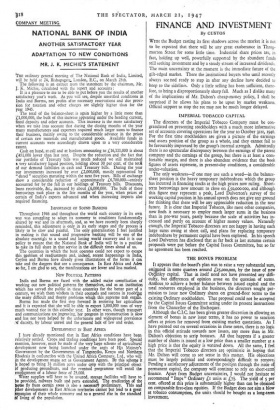FINANCE AND INVESTMENT
By CUSTOS
WITH the Budget casting its first shadows across the market it is not to be expected that there will be any great exuberance in Throg- morton Street for some little time. Industrial share prices are, in fact, holding up well, powerfully supported by the abundant funds still seeking investment and by a steady stream of increased dividends. The main uncertainty at the moment is the immediate future of the gilt-edged market. There the institutional buyers who until recently always seemed ready to step in after any decline have decided to keep to the sidelines. Only a little selling has been sufficient, there- fore, to bring a disproportionately sharp fall. Much as I dislike many of the implications of Mr. Dalton's cheap-money policy, I shall be surprised if he allows his plans to be upset by market weakness. Official support to stop the rot may not be much longer delayed.
IMPERIAL TOBACCO CAPITAL
The directors of the Imperial Tobacco Company must be con- gratulated on presenting stockholders with a much more informative set of accounts covering operations for the year to October 31st, 1946. For the first time stockholders are given a picture of the earnings and assets position of the group as a whole, and they cannot fail to be favourably impressed by the group's internal strength. Admittedly there is no spectacular discrepancy between the earnings of the parent company and the earnings of the group, but there is at least a com- fortable margin, and there is also abundant evidence that the book figures of assets represent, in present-day conditions, a considerable under-valuation.
The only weakness—if one may use such a word—in the balance- sheet position is the heavy temporary indebtedness which the group has incurred in financing stocks at the high prices now ruling. Short- term borrowings now amount to close on k5o,000,000, and although this figure may represent a peak, Lord Dulverton's survey of the working capital position in his annual speech does not give any ground for thinking that there will be any appreciable reduction in the near future. It is clear that Imperial Tobacco, like most other companies, now finds it necessary to employ much larger sums in the business than in pre-war years, partly because the scale of activities has in- creased and partly on account of higher money values. Naturally enough, the Imperial Tobacco directors are not happy in having such large sums owing at short call, and plans for replacing temporary indebtedness by permanent capital have been explored. In his speech Lord Dulverton has disclosed that as far back as last autumn certain proposals were put before the Capital Issues Committee, but so far no agreement has been reached.
THE BONUS PROBLEM
It appears that the board's plan was to raise a very substantial sum, ted in some quarters around £25,00o,000, by the issue of new Or_ ary capital. That in itself need not have presented any diffi- culty, but differences of opinion arose on the question of terms. Angious,to achieve a better balance between issued capital and the total resources employed in the business, the directors sought per- mission to issue new Ordinary shares on ground-floor terms to the existing Ordinary stockholders. That proposal could not be accepted by the Capital Issues Committee acting under its present instructions from the Chancellor of the Exchequer.
Although the has been given greater discretion in allowing an element of bonus in new issue terms, it has no power to sanction offers at prices far removed from existing market quotations. As I have pointed out on several occasions in these notes, there is no logic in this official attitude towards new issues, any more than in Mr. Dalton's objection to scrip bonuses. All that happens if a greater number of shares is issued at a low price than a smaller number at a high price is that the equity is watered down. All the same, I feel that the Imperial Tobacco directors are optimistic in hoping that Mr. Dalton will come to see sense in this matter. His objections, must be largely political and correspondingly difficult to remove,; Pending a satisfactory adjustment of the position through the issue of permanent capital, the company will continue to rely on short-term finance. Apart from Budget uncertainties, I would not hesitate to' recommend " Imps " Ordinary £r units at £74. The yield of 5 per cent. offered at this price is substantially higher than can be obtained on comparable first-class equities. If the Budget does not aim a blow at tobacco consumption, the units should be bought as a long-term investment.


































 Previous page
Previous page